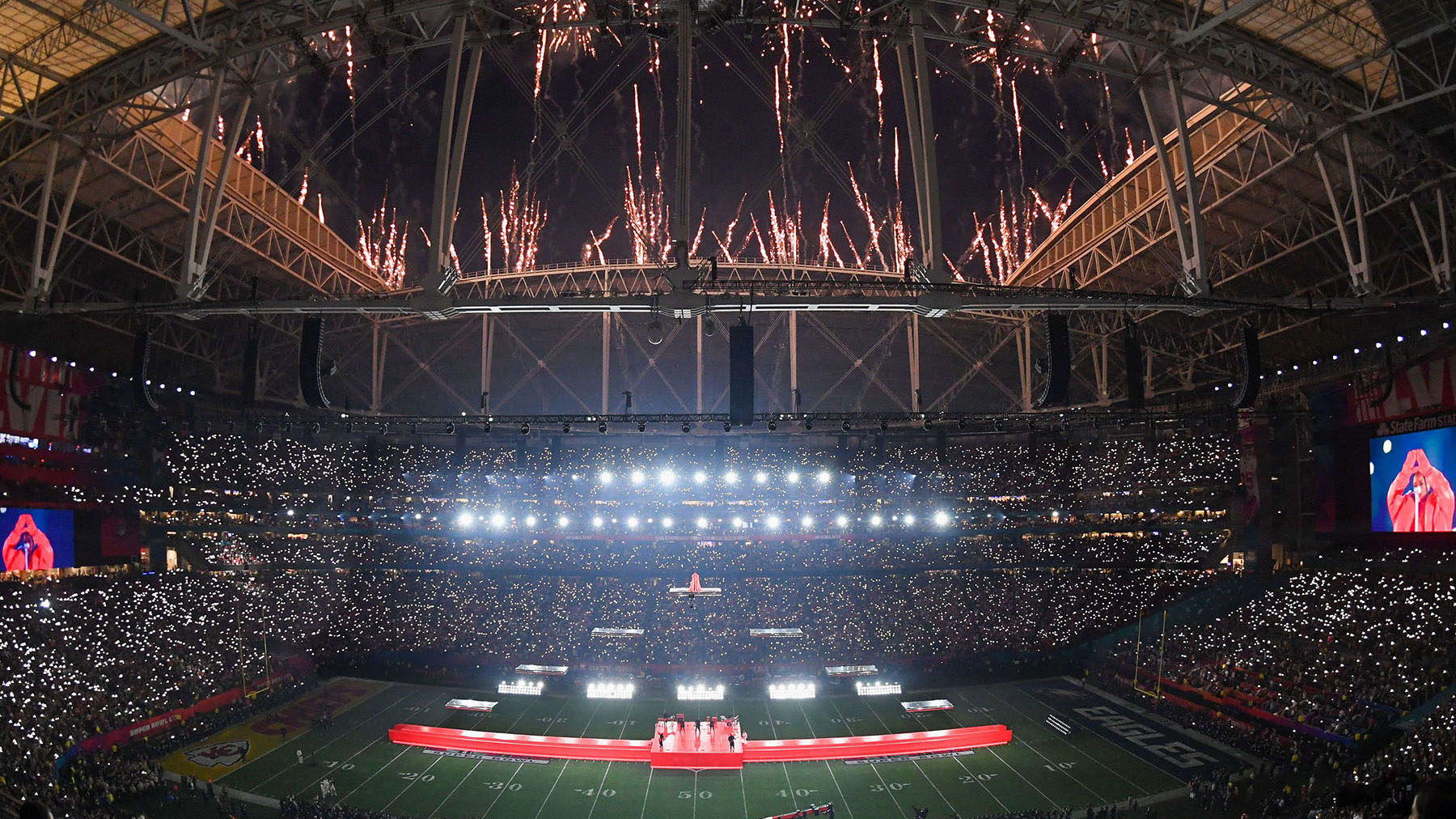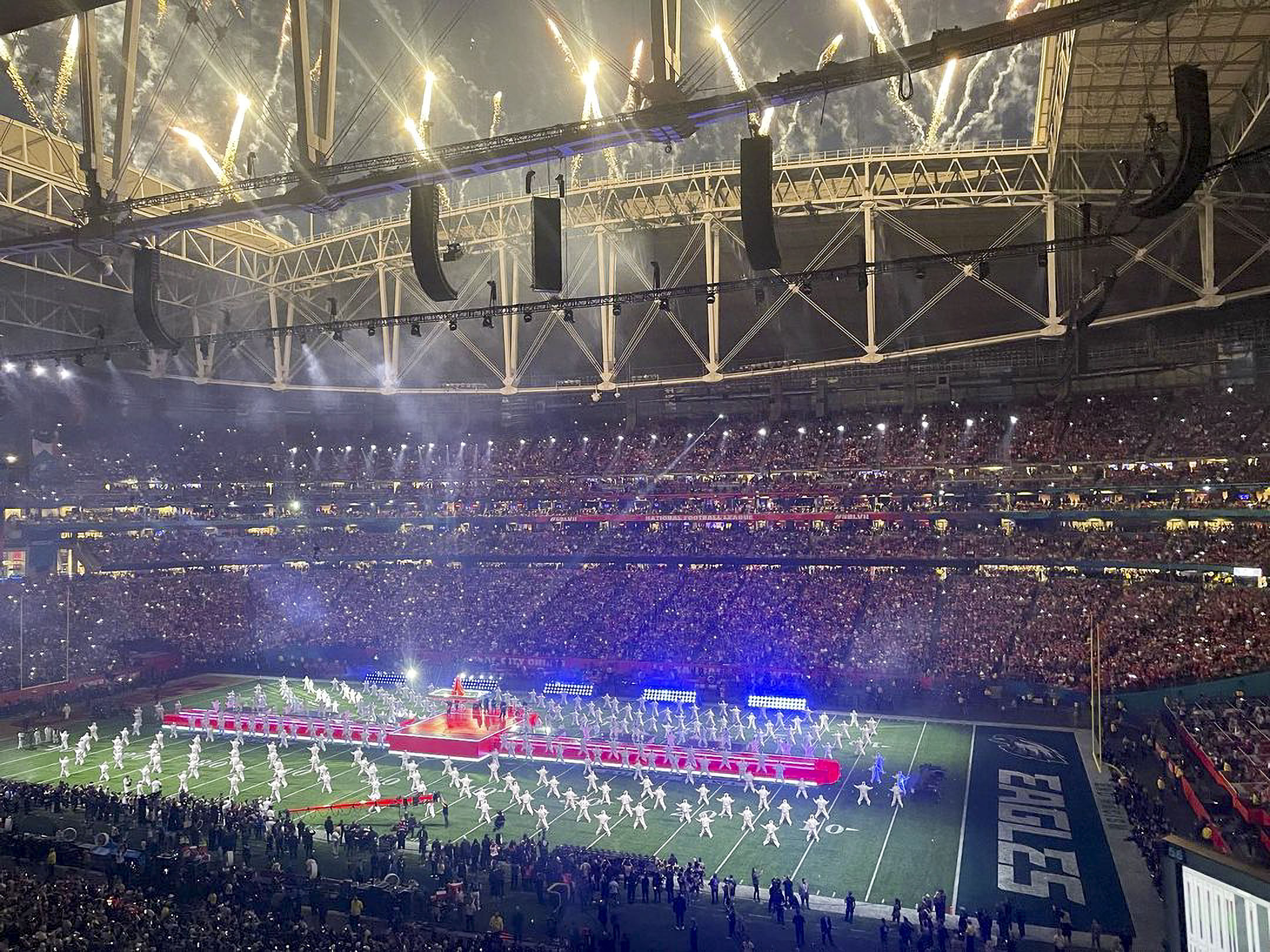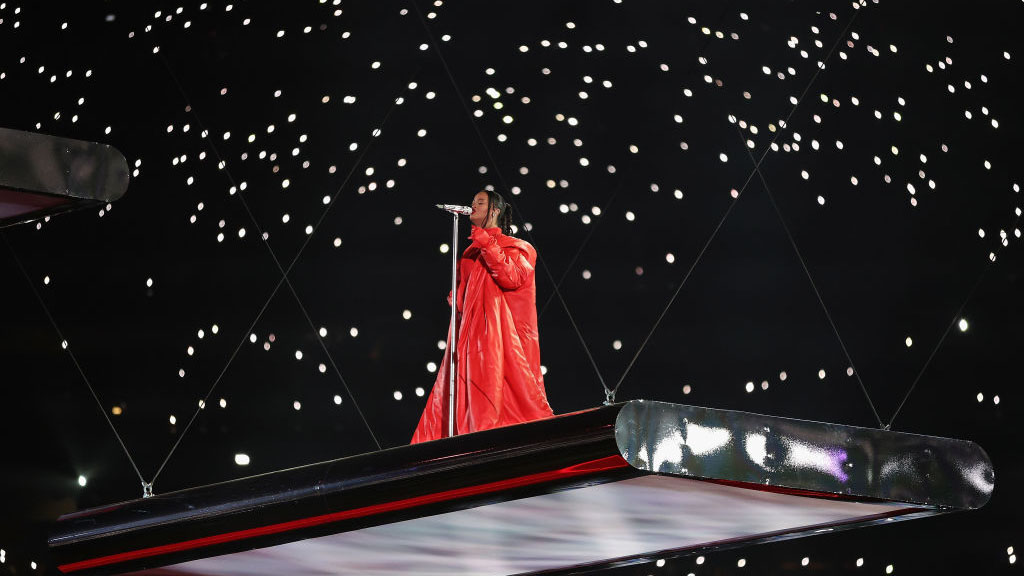On Sunday, February 12, nine-time Grammy Award-winner Rihanna took centerstage during halftime at Super Bowl LVII, which pitted the Kansas City Chiefs against the Philadelphia Eagles. Or, more precisely, she took off, riding a gravity-defying platform flown from the rigging of Glendale, AZ’s State Farm Stadium, in a production that was as stunning as her eye-popping red outfit. It was a performance that rivaled the game itself: 13 minutes featuring the best of her big hits, including “Umbrella,” “Work,” “Diamonds,” and “Run This Town,” and a cast of an estimated 100 dancers, many of whom were also suspended in the air. It was a show that demanded the absolute best sound possible, which it had, thanks to an L-Acoustics K2 system deployed by ATK Audiotek, a Clair Global brand.
The deployment of the halftime sound system was very different this year. In the past, the temporary music system was loaded on wheeled carts that could be quickly moved into position as part of the overall halftime production staging, which takes place in a matter of minutes with scores of local volunteers pushing all of the staging elements together just after the referee’s halftime whistle sounds. However, the location of this year’s Super Bowl at State Farm Stadium meant it would be played on the venue’s unique but carefully groomed retractable grass field.
[Meet the Wireless AV Team from Super Bowl LVII]
“The NFL mandated that nothing be on the field this year, so that meant no carts,” said Powell. Instead, the entire temporary sound system was flown. That, he adds, turned out to be a positive one. “Going in the air gave us more room, which meant more boxes—over 200 altogether, compared to the 76 boxes we could load on the carts—which meant more power and better, more complete coverage, even to the upper reaches of the bowl.”
State Farm Stadium already featured a fixed L-Acoustics system installed in 2016, primarily comprising a total of 122 K2 and 32 K1-SB enclosures. In preparation for this year’s halftime show, ATK supplemented the installed system with six more identical arrays of 13 K2 over four K1-SB, three arrays per side suspended from the venue’s Brunel truss system, plus four sideline hangs of KS28 subs. They also flew two 10-enclosure arrays of L-Acoustics K2 plus a single sub hang of eight KS28 at each end zone. ATK’s system was powered by L-Acoustics LA12X amplified controllers, while LA8 amplified controllers drove the house system.

“We turned off the stadium’s end-zone K2 hangs because they weren’t in the positions we needed for the show,” explained Kirk Powell, engineer in chief for ATK on the project. “They are more of a shower-cluster design and not the right fit for the system we designed. The K1-SB in the sideline clusters is configured more for low-frequency extension of the clusters,” with the eight clusters of KS28 providing the “true” subwoofer performance. Additionally, eight subwoofers were also deployed for the lower bowl. There was a lot of power and a lot of subs, and according to Powell, they all got plenty of use. “This was a heavy low-end show,” he said.
Signal transport was over Dante to Focusrite RedNet D16Rs interfaces and from them to the LA12X amps over AES. The system was rounded out by a pair of DiGiCo Quantum338 audio consoles at FOH and an SD5 console used to mix monitors.
[Super LED Displays for Super Bowl Sunday]
Dave Natale, who mixed front-of-house for Rihanna’s performance, has had a storied career. He’s mixed live sound for The Rolling Stones, Prince, Tina Turner, Stevie Nicks, Yes, Mötley Crüe, Fleetwood Mac, and more, as well as the four most recent Super Bowl halftime shows. He was, in a word, impressed by the performance of the K2 system there.
“This was a real ‘rock’ PA system,” said Natale. “It was one gigantic music system made up of the best technology and put together by people who really know what they’re doing. It didn’t just sound great—it sounded great everywhere. [ATK audio project manager, system designer, and pre-and post-game event mixer] Alex Guessard and I walked through the entire venue, from the 100 level to the 300 level and two levels of suites in between, and every seat sounded great. And that’s despite a challenging rigging situation that limited where they could place hangs, which were mostly along the sidelines.”

Natale had special praise for the system’s low end, which was especially critical for this show. The combination of the eight-box KS28 sub-cluster in each end zone, the four K1-SB atop each sideline hang, and two hangs of KS28 subs, coupled with the additional eight subs, created a “spectacular” low-end environment, he says. “They had to move a lot of air in there, and they did, with a ton of headroom to spare,” he added. “It was simply powerful.”
Having an L-Acoustics PA as the installed venue system was also a huge plus. “We went with L-Acoustics primarily because it’s such a great-sounding system and because it really simplified system design and integration with the house system,” Powell points out. “It gave us more options, and options are great to have. The show sounded fantastic, and everyone was happy with how it turned out. Everyone was smiling at the end.”
